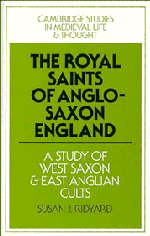Book contents
- Frontmatter
- Contents
- Dedication
- Acknowledgements
- List of abbreviations
- 1 The royal saints of Anglo-Saxon England: some problems of interpretation
- 2 The sources
- 3 Royal birth and the foundations of sanctity: theoretical interpretations
- 4 The cult of St Edburga at Winchester and Pershore
- 5 The children of Edgar
- 6 The royal cults of Ely
- 7 The cult of St Edmund
- 8 Piety, patronage and politics: towards an understanding of the Anglo-Saxon royal cults
- Appendix 1 The Life of St Edburga of Winchester by Osbert of Clare, prior of Westminster
- Appendix 2 Two items concerning St Edburga of Winchester from Oxford, Bodleian Library, MS Bodley 451
- Bibliography
- Index
- Frontmatter
- Contents
- Dedication
- Acknowledgements
- List of abbreviations
- 1 The royal saints of Anglo-Saxon England: some problems of interpretation
- 2 The sources
- 3 Royal birth and the foundations of sanctity: theoretical interpretations
- 4 The cult of St Edburga at Winchester and Pershore
- 5 The children of Edgar
- 6 The royal cults of Ely
- 7 The cult of St Edmund
- 8 Piety, patronage and politics: towards an understanding of the Anglo-Saxon royal cults
- Appendix 1 The Life of St Edburga of Winchester by Osbert of Clare, prior of Westminster
- Appendix 2 Two items concerning St Edburga of Winchester from Oxford, Bodleian Library, MS Bodley 451
- Bibliography
- Index
Summary
THE LEGENDS OF THE SAINTS
In the making of a cult the preservation or acquisition of relics and the establishment of a shrine was but a first step. The success of the shrine was dependent upon continuing effective publicity; and that dependence generated a specialised literature whose function was to document the earthly career of the individual and to demonstrate the authenticity and efficacy of the relics there venerated. Among sources for the history and interpretation of the cults of the saints that literature occupies a place of prime importance. For the great majority of cults hagiography provides the earliest and by far the most complete evidence; for some it provides the only evidence. More than this, because it was generally written in association with the promotion of a cult, hagiography was itself a product of the phenomenon which it describes: it opens a unique window on the meaning which the cult held for its promoters and for its clients. The problems inherent in the genre, however, have caused it to be viewed with deep suspicion by generations of historians: it is the purpose of the following pages to review some of those problems and to propose a working model for the constructive use of the legends of the saints.
- Type
- Chapter
- Information
- The Royal Saints of Anglo-Saxon EnglandA Study of West Saxon and East Anglian Cults, pp. 8 - 73Publisher: Cambridge University PressPrint publication year: 1989



